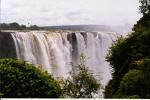It is a moderate distance back to the airport and the drive is the reason to stay in Pretoria (as well as seeing the Presidential residence across from the hotel). The countryside resembles Wyoming or Montana – high terrain with open vistas. There is a good deal of smog never-the-less and construction the entire length of the trip. I note that every residence in Pretoria has not only walls but also barbed wire for protection. My driver says he likes Pretoria because there is much less crime than other areas. Between the two cities are new developments. Each area is surrounded by two sets of walls with clear ground in between. The communities contain their own shops and restaurants. It all reminds me of the DMZ in Korea, combined with any planned community in the U.S.
S15.425592 E28.317561
I land in Lusaka at 1PM. The first person I meet is Kennedy, who is cheerful and gregarious. We get to know each other (he just proposed) while waiting for a second van, the one Kennedy drove to the airport will not start and probably needs new gaskets.
Dave Neiswander is the man I’ll be working with most closely while in Zambia. He is currently in Kenya trying to establish some contacts to expand the organization into that area. So Kennedy takes me to see F.K. who is at the Tata facility.
Tata is the Indian conglomerate who is best known for cars and who recently purchased Land Rover and Jaguar from Ford. They are also one of the chief providers of bicycles to Africa. WBR has partnered with Tata; Tata provides warehouse facilities and skilled workers, and WBR provides more modern management techniques and quality control.
My first hour on the ground in Zambia and we are in fact discussing quality control. WBR has recently switched suppliers for the rear hub of it’s bicycles. Formerly, the hubs came from the Czech Republic and a company called Vello Steel. The Czech hubs were marked by over engineering and an outdated design that eventually left the bike useless under the extreme use of the Zambians (couriers often carry 75Kg of coal). This year, WBR initiated a lab and field tests on hubs made in Taiwan by several companies including Shimano and KT (Kun Tang). The KT hubs proved to be 30% cheaper, more reliable in design and easier to repair. An additional factor in KT’s favor, the company is willing to work with WBR to revise designs to meet the specific needs of the Zambian market. Unfortunately, the hubs sent to Zambia for production are not holding up as well as those used in the initial tests. Failure rates are as high as 80% with many hubs already broken in the box.
The initial actions are 1) determine the cause of the failiures and 2) determine where the difference occurred between testing and manufacture. WBR has an additional set of immediate concerns. Last week the organization rolled out phase II of it’s operations in Zambia; 50,000 bicycles going to help keep students, primarily female students, in school. Two hundred bicycles are already in the field, with several hundred more scheduled for immediate delivery. Of those delivered, over half have the new faulty hubs.




No comments:
Post a Comment